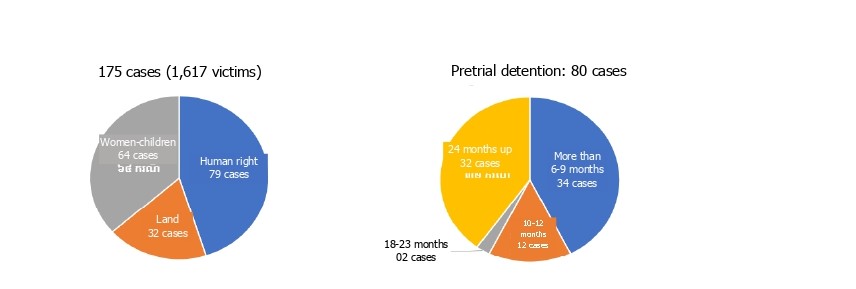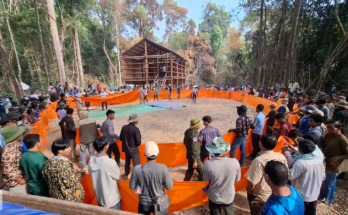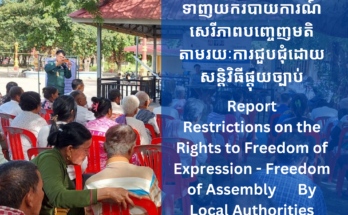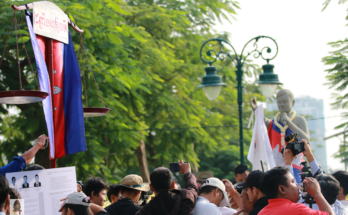Summary of the Hearing Monitoring Results

| No. | Description – Court (A total of 175 cases) | Cases | Percent |
| 1 | Barred to entry or evicted from the courtroom (public) | 142 | 81.1% |
| 2 | Barred to entry or evicted from the courtroom (Reporter) | 116 | 66.3% |
| 3 | Failed to explain in detail about the right to have an attorney-at-law or the right to defend oneself | 69 | 40% |
| 4 | Failed to explain in detail about the right not to answer | 95 | 54% |
| 5 | Failed to explain in detail about the right not to compel to confess guilt | 94 | 54% |
| 6 | Failed to explain in detail about the right to presumption of innocence | 94 | 54% |
| 7 | The accused wore a prison uniform during the trial | 132 | 75.4% |
| 8 | The accused were handcuffed during the trial | 72 | 41% |
| 9 | Prosecutors shouted when the accused failed to answer | 07 | 4% |
| 10 | The trial judge told the accused to apologize | 81 | 46.3% |
| 11 | Judges/Prosecutor’s Representative demonstrated intimidating behavior toward the accused | 18 | 10.3% |
| 12 | Judge/Prosecutor left the room during trial | 82 | 47% |
| 13 | Judges/Prosecutors used their phones during trial | 33 | 19% |
| 14 | Court postponed the pronouncement of judgment | 170 | 97% |
| 15 | Court postponed the judgment without specifying a date | 94 | 54% |
| 16 | Court added new offense when issuing the judgment | 137 | 78% |
u ADHOC monitored a total of 175 trials in 20 capitals and provinces, with 45.1% of human rights cases, 18.3% of land rights cases and 36.6% of women and children’s cases. There were 137 criminal cases and 38 misdemeanor cases, with a total of 1,165 victims and 452 plaintiffs.v 142 out of 175 cases: the accused were remanded in custody, and as of the date of the trial, the accused in 80 cases had been remanded in custody for more than six months to 24 months.w The court was still late in opening the hearing by more than an hour to two hours compared to the time set out in the summons and the actual time of hearing.x The court was still late in issuing invitations for the attorney-in-law representing the parties to participate in the proceedings at the prosecutor stage, the investigation stage and the trial stage, as the invitation letter arrived only one or two days before the start of the proceedings. y In most cases, especially in cases of land disputes between communities and wealthy people, the trial judges disallowed (failed to summon) the exculpatory witnesses to testify despite their attorney-at-law’ requests (for example, in cases of land disputes in the Koh Kong and Sihanoukville province, etc.).z In up to 90% of the case, the courts failed to inform of the judgment, such as the final judgment and the closing order.
{ Sometimes, the court summoned the clients but failed to invite the attorney-at-law, but if the attorneys-at-law were invited, the court failed to summon their clients to the prosecutor stage or the investigating judge stage.
Recommendations
- The Ministry of Justice should set out specific measures against any actions of judges and prosecutors that contradict the objectives of Article 208 and Article 209 of the Criminal Procedure Code 2007, which stipulate the duration of pre-trial detention. According to the report, in 80 out of 175 cases, they were remanded in custody for more than 6 months to more than 24
- The Ministry of Justice should examine and impose severe administrative penalty on judges and prosecutors who delay the performance their duties in opening a trial. According to the report, there was a delay of more than an hour to two hours compared to the time specified in the summons and the actual time of the hearing.
- The Ministry of Justice should set out specific measures against any actions of judges and prosecutors who delay the issuance of invitations to attorney-at-law and parties to the trial.
- The Ministry of Justice should review and set out specific measures against any actions of judges and prosecutors who fail to invite the attorney-at-law to accompany their clients to listen to their clients’ answers at the prosecutor and judge stages.
- The Ministry of Justice should examine and set out specific measures against any action of judges and prosecutors who fail to notify the judgment, such as the final judgment and the closing order.
- Judges and Prosecution Representatives should consider using words or talking about the innocence or guilt of the accused before issuing the judgment, such as telling the accused to apologize.
- The judge should consider the rights of the accused, such as those wearing prison uniforms and being handcuffed during the trial.
- The judge should explain to the accused/victims clearly about their rights to be granted, such as the right to have an attorney-at-law, the right not to answer, the right not to be compelled to confess guilt and the right to the presumption of innocence, the right to know the charges, the right to know date or place of crime etc.
- The Ministry of Justice should set out specific measures for all courts of first instance to be open to the public and reporters to attend public hearings without restriction or eviction.
For more information, please contact:
Mr. Soeung Senkarona Spokesperson of ADHOC 086 324 666 / 089 666 312
ទាញយករបាយការណ៍៖



